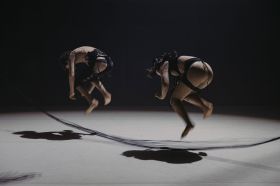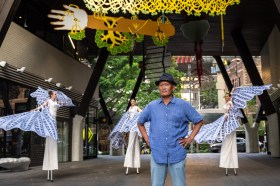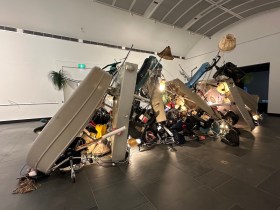Image: pexels.com
When Princeton University professor Johannes Haushofer published his CV of failures on Twitter, it was soon retweeted and picked up by major news outlets, quickly going viral.
Behind the act of vulnerability was an attempt to “balance the record” and encourage others to pick themselves back up in the face of failure.
‘Most of what I try fails, but these failures are often invisible, while the successes are visible,’ writes Haushofer.
‘I have noticed that this sometimes gives others the impression that most things work out for me. As a result, they are more likely to attribute their own failures to themselves, rather than the fact that the world is stochastic, applications are crapshoots, and selection committees and referees have bad days.’
For Jacyl Shaw, Director Engagement, Carlton Connect and panelist in that Good F Word, failure gets a bad name because of our polarizing nature. ‘It’s win or lose in sport, pass or fail in exams, success or failure in a company. It’s as if saying [that] there are shades in between (or to claim failure is part of the learning process) is a sign of failure itself.
‘I think the bad name badge also comes from the very fact we emphasis, placate and celebrate its more able sibling – “success” – in almost revered, hushed dulcet tones,’ Shaw said.
The CV of failures is about embracing failure that goes beyond the buzz-word. ‘People can say they embrace it but it’s important to see actions from words.’
What’s so powerful about hearing others recount their failures is that it helps eradicate the inferiority complex – those we admire or contemporaries with the career we envy are people too, people who have taken wrong turns, dealt with rejection, left projects unfinished and failed.
In the creative industries where your work is often inextricably linked to your thoughts, feelings, passions, and who you are, it’s inevitable that we compare our success and failure to other people.
Read: How to stop comparing yourself and enjoy your own success
In the spirit of candor, we have asked a handful of arts leaders to share with us their own “CV of failures” and words of encouragement for when things don’t go according to plan.
Veronica Pardo, Executive Director, Arts Access Victoria
I’ve struggled a bit to come up with suitable examples. I’ve gotten every job I ever applied for, but that’s only because I’m very fussy about where I work so I don’t really apply for many jobs! However…
Number of funding applications I’ve written over the years: 104. Unsuccessful: 54
Number of leadership programs I’ve thought about applying for: seven. Number I’ve actually applied for: one.
Number of years I’ve promised myself I would walk around Albert Park Lake at lunch time: seven. Number of years I’ve actually done it: zero.
I don’t know who first said it, but they were absolutely right that we learn more from our “glorious failures” than our successes. Our successes can make us complacent, while our failures light fires inside us. One of my “glorious failures” was discovering too late that a major event I was responsible for was in an inaccessible building, then having to tell a person using a wheelchair that they couldn’t come in. The burning shame of that moment is ingrained in my psyche forever. In the end, I cancelled the event and told everyone to leave, apologising to all and sundry as they exited the building amid confusion and annoyance. But in the wake of failure comes reflection and learning. And tomorrow, to quote Samuel Beckett, we try again. Fail again. But fail better.
In my work, I probably fail as many times as I succeed. Trying to convince people to set aside their ingrained prejudice or indifference towards people who are different is a task for cultural warriors.
Our DNA is geared towards failing, picking ourselves up, trying again, failing again, and again, and again until, at last, we succeed. I’m grateful for these failures, because they sharpen my mind and my arsenal for advocacy. I’m not overly preoccupied with my failures, however. It’s the failure of others to be humane, egalitarian and courageous in the face of human suffering that really confounds me.
Simon Abrahams, Creative Director & CEO, Melbourne Fringe Festival
Failure to get the wrong job x LotsI can barely keep track of the number of wrong jobs I’ve applied for over the years, especially early in my career – jobs I was over-qualified for, jobs I was hideously under-qualified for, jobs I would have hated, jobs where everyone would have hated me, jobs in countries I didn’t want to live in, jobs that suck your soul. Thankfully, in hindsight, I didn’t get any of them. I’ve taken the wrong job once or twice and it’s not a mistake I’ll make again – a values fit is much more important to me than money, prestige or power.
Esther Anatolitis, Director, Regional Arts Victoria
- Numerous fellowships and scholarships and a discontinued PhD.
- Bookseller, every fave bookshop in Melbourne, 2002. I had just relocated to Melbourne after a year-long architectural project overseas, and was working on a number of projects. Despite extensive bookshop and library experience in Sydney, by 2002 nobody would give me a part-time job. Melbourne booksellers: I salute you. Your persistent rejections have got me to where I am today.
- Director roles at three cross-disciplinary Melbourne arts and cultural institutions.
- A very senior government job where, in retrospect, I was relieved that I performed poorly in the interview because my heart just wasn’t in it, and so I withdrew – but continued to feel awkward about my interview performance!
- Various ongoing EP or program manager roles at one public broadcaster after contracted stints doing the same work. Head of Arts at the other public broadcaster.
Kate Larsen, Director, Writers Victoria
I feel uniquely qualified (if newly depressed) in attempting to share and catalogue my failures, having recently compiled a statistical analysis of my last 27 years from the collection of annual letters I’ve been writing to myself since 12 years of age.
Number of years I’ve talked about needing to find more time for my writing: 20
Number of years I’ve felt comfortable with the amount of writing I’ve achieved: two
Number of years I’ve talked about the importance of writing and performing music in my life: 10
Number of years I’ve been happy with what I’ve been able to do: two (both in high school)
Total number of jobs I applied for last time I was job-hunting: 20
Number of jobs I got: one
Number of times I applied for a job with one of the organisations based within Melbourne’s literary hub: three
Number of jobs I got: one
Number of journals, magazines or competitions I submitted work to in 2015: seven
Number of works accepted for publication: zero
Jess Scully, Founding Director and Curator, Vivid Ideas
I’ve never really applied for jobs, I’m a project person rather than a job person. I pitch or come up with ideas and or work on ideas with people and they do or they don’t happen so it is different.
But my biggest failure and the one that weighs on me most heavily is that I never finished uni. I was studying journalism and law at UTS and I got four years through a five year degree, and I basically had 24 credit points left to do. At the time I was editing Yen Magazine and I distinctly remember when I realized that enrollment was that day and I thought, oh I’m busy, I’m really engaged in what I’m doing right now at work so I’ll just deal with that later. And then 11 years went by!
Then I thought, gosh I really should finish and I got back in touch with the university and tried to find a way to go back but I have not been able to so because I let it slip for too long.
So that’s my biggest failure – failing to finish uni. And while it hasn’t held me back so far I feel that it is an impediment to me doing the research and the work that I want to do for the next phase of my career.
Failure number two follows on from that. All my work is about the creative industries and the creativity economy and I decided to start writing a book called Strategies for Creative Economies. I spent three months working on it in New York in 2010, and three months in Berlin in 2011, but by the end of that that period I realized what I had written was half of an academic research paper. That is when I really realized that I needed or would like to go to university and do a masters by research.
I stopped writing the book – or you could say I failed to finish the book – because I didn’t have the support or academic foundation that I felt it needed to be the best it can be. Since then I’ve been struggling to find the right context to return to the book and it’s something I really regret.
Another thing that was a personal disappointment was that I applied for an Asia Link fellowship and wasn’t successful in securing one of those.
There are loads of other projects that I developed that never got off the ground, but when you work independently you don’t catalogue your failures – you have to maintain that forward momentum, you have to go that project didn’t work, next, move on, what is the next thing on the horizons.
In any garden you plant a lot of seeds, and only sometimes you think about the ones that didn’t bear fruit. In my case the ones that I remember and I suppose continue to have resonance for me are the ones where I feel are unfinished business – those that feel unresolved or they could continue to be useful.
The ones that failed to sprout don’t bother me, I just think of them as fun intellectual exercises where you got to play for some friends for a while.






